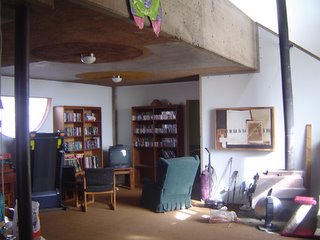Next Steps
The next step for Arcosanti is, obviously, to pave the road. Paolo's anti-automobile bias is no reason not to pave the road. Any city without a rail link will need 18-wheelers to supply goods. Even if the residents of a finished arcology would not need personal cars for daily use, they would still go on vacation occasionally, and receive visitors from out of town. Not to mention the fact that Paolo himself commutes between Cosanti and Arcosanti every week. So paving the road should be the next step. The bigger question is what to do after that.
By this point it's become obvious that Cordes Lakes isn't going anywhere. At the same time, the separation between Arcosanti and the neighbors is quite distinct. As long as the town and the arcology are out there, why not benefit from one another? Why not build something that Cordes needs now, and Arcosanti will need eventually? The eventual residents of a finished arcology should not have to drive to Prescott Valley to do things like banking and grocery shopping. Come to think of it, not having to drive all over the countryside is supposed to be one of the key features of living in an arcology.
Arcosanti has a tiny population. Cordes Lakes isn't much bigger, but definitely has a few more people. Why not invite a bank to move into Arcosanti, or a grocery store? To appeal to the current inhabitants of Arcosanti, it could be a Trader Joe's or a Whole Foods. How about a minor emergency clinic? It can't be fun for Cordes Lakes residents to drive to Mayer or Prescott Valley for treatment of a bad sprain or a deep cut. Right now, Cordes Lakes is mostly a bedroom community. If it keeps growing, it's going to acquire the basic businesses that a town needs. Why not host them at Arcosanti? The Cosanti Foundation could definitely use some income from rent.
Paving the road and bringing in basic community services like banking, shopping and health care could help Arcosanti grow, and might be a good start toward improving relations with the neighbors. While living at Arcosanti, I met people at the Cordes Junction McDonalds and the Evergreen hardware store who had lived in the area for years, but never visited the construction site that Paolo built. When co-workers in Houston asked me whether I was moving to Arizona to join a cult or a commune, that was understandable. Arcosanti was hundreds of miles away, and they'd never heard of it. On the other hand, I recently read a column about Arcosanti, wherein a local McDonalds employee confided her suspicion to the author that the place at the end of the dirt road was a cult compound. When people three miles away don't know what's going on right around the corner, that's sad. Having Cordes residents coming into Arcosanti for groceries or bandages would help to demystify Arcosanti. It would be great if the locals encouraged their friends and relatives to come see "that neat place down the road", rather than warning complete strangers about possible cultists.
Aside from the awareness- and income-generating properties of tenants renting space in Arcosanti, there is another benefit: Arcosanti could leave behind its current status as a company town. Nearly every long-term resident that Arcosanti has ever had has been either a volunteer, or an employee of the non-profit Cosanti Foundation or the for-profit Cosanti Originals company. Arizona is littered with the bones of company towns, mostly mining towns. When the mine does well, the company towns do well. When the price of metals goes down, the company towns suffer, or disappear. An economy based on one or two employers is inherently unstable. A town with one or two employers mostly attracts people in the company's field. The urban effect comes from people who have not moved to town to build the town, or to work in a single industry.
Next step after the first Arcosanti-based businesses: sewage. The oxidation pond is antiquated and inefficient, and it would quickly be overwhelmed if Arcosanti began to grow. There are rumors of groundwater surfacing downhill from the pond. A wastewater treatment plant could be designed as a modular system that would grow with the arcology. An activated sludge plant should be natural enough to satisfy Arcosanti residents' preference for Earth-friendly options. The wastewater is not treated by mysterious chemicals, but by microbes. Install a UV sterilizer instead of disinfecting with chlorine, and the only chemicals left are coagulants that only see occasional use.
In the meantime, Arcosanti could experiment with wider exposure. An ad in the back of Smithsonian magazine, while pricy, might give workshop attendance a huge shot in the arm. Similar ads in the back of anti-sprawl zines, or booths at sprawl-related conventions, could also help. There's a growing backlash against the 2-dimensional amoeba cities of America. It's time to raise awareness of an alternative, persistently struggling to be born in the Arizona desert.






